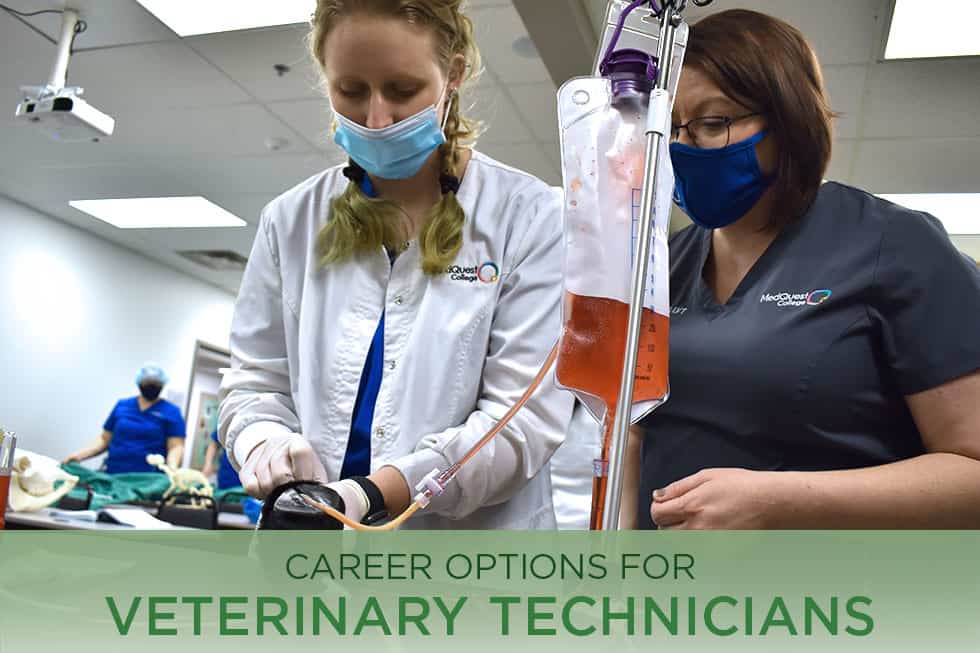It’s safe to say that people from all walks of life have loved animals going back to the days of Charles Darwin, who said, “The love for all living creatures is the most noble attribute of man.” Some people take that affection to a new level and dedicate their careers to helping animals. We’re talking about veterinary technicians, also known as – vet techs. If you’re considering a future in the rewarding field of veterinary technology, we’re breaking down the different career options you can pursue as a vet tech. But first things first, let’s cover some of the basics.
What is a Vet Tech?
A vet tech is a trained and skilled animal healthcare professional who assists veterinarians in various settings, such as veterinary clinics, animal hospitals, research labs, and animal shelters. They play a vital role in caring for animals and ensuring their health and well-being.
Typical Duties of a Vet Tech
Vet Techs work under the supervision of veterinarians to provide medical treatment and care to animals. Working as a vet tech typically involves performing the following duties regularly:
- Administering and dispensing medications
- Assisting veterinarians with surgeries
- Collecting lab specimens for testing
- Educating pet owners about proper animal care and nutrition
- Imaging / X-Rays
- Office Administration
- Patient assessment/nursing care
- Dental care
Requirements to Become a Vet Tech
The training and education requirements to become a vet tech can vary from state to state. Typically, you must complete an accredited veterinary technology program and pass the Veterinary Technician National Examination (VTNE). The curriculum in a vet tech program will usually include coursework in animal anatomy and physiology, pharmacology, surgical nursing, laboratory procedures, radiology, office and hospital procedures, communication, and law and ethics. Most programs can be completed in around 24 months and often involve hands-on clinical experience through externships in actual veterinary facilities. Once you’ve completed your training, it’s time to choose the career path that’s right for you. Let’s explore some of the options.
Clinical Practices
One of the most popular career paths for vet techs is working in clinical practice. In a clinical setting, vet techs may work in private practices, animal hospitals, emergency clinics, etc. Some may even specialize in certain areas, such as dentistry or anesthesia. One advantage of clinical practice is building relationships with clients and their pets.
Animal Shelters or Rescue
Working in an animal shelter or rescue is another career option for vet techs. In this role, they play a critical role in caring for animals waiting to be adopted. They work closely with shelter veterinarians to provide medical care, including administering vaccines and medications, conducting exams, and assisting with surgeries. Vet techs in animal shelters may also work directly with the animals to socialize them, ensuring they are comfortable around humans and other animals.
Animal shelter work could be gratifying for those passionate about helping animals in need. It is also another opportunity to gain hands-on experience and further develop your veterinary skills. The demand for animal shelter vet techs is growing, making this a promising career path for anyone interested in creating a difference in the lives of animals.
Research Opportunities
There are numerous animal research opportunities for vet techs with a passion for science and research. Research facilities, universities, and government agencies all employ vet techs in their research programs, providing opportunities to work with animals in a laboratory setting, and can offer a range of opportunities to advance medical knowledge, help develop new treatments, and improve the overall health and well-being of animals.
Some areas where vet techs can work in research include animal behavior, genetics, microbiology, nutrition, and drug development. Depending on the research project’s focus, vet techs may be responsible for monitoring animal health, administering treatments, and collecting and analyzing data.
Zoos or Wildlife Preserves
If working with a diverse range of exotic animals sounds appealing, there’s always a need for skilled vet techs to assist veterinarians who treat animals in zoos or wildlife preserves. You won’t likely be treating cats and dogs, but you could work with everything from lions and tigers to birds, primates, and many other species.
Career Outlook for Vet Techs
Just like healthcare for humans, jobs in the veterinary healthcare industry are on the rise. A contributing factor to the growth of the vet tech profession is the rise of specialty veterinary care. As more and more pet owners seek specialized care for their animals, there is a greater need for veterinary technicians with advanced training and expertise in dentistry, oncology, and surgery. The Bureau of Labor Statistics projects new jobs for vet techs to increase by 20% by 2031, much faster than the average for all occupations.
It’s hard to imagine a better way for an animal lover to earn a living than working to improve the lives of the pets we love. If you’d like to learn more about a career as a vet tech, check out the veterinary technology program at MedQuest College. MedQuest is helping animal lovers like you get the training and skills they need to launch new careers in the world of veterinary technology. Contact us today for more information.

